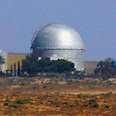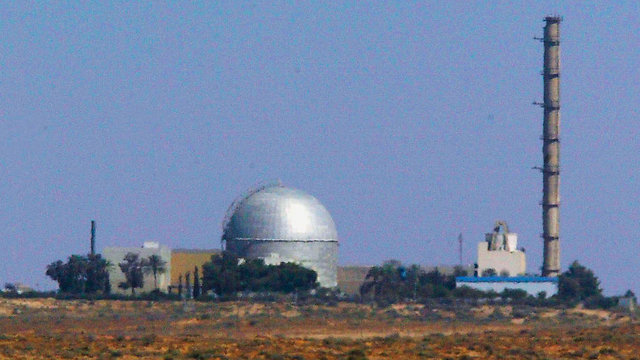
UN nuclear assembly rejects Arab push on Israel
Earlier, Arab League envoy to IAEA says 'world has to know that Israel is not playing a constructive role, that it has nuclear capability'
Member states of the UN nuclear agency on Friday rejected an Arab resolution singling out Israel for criticism over its assumed atomic arsenal, in a diplomatic victory for Western powers that opposed the initiative.
Arab states had submitted the non-binding resolution to the annual gathering in Vienna for the first time since 2010 to signal their frustration at the lack of progress in efforts to move towards a Middle East free of nuclear weapons.
Fifty-one countries voted against the text and 43 states for.
Related stories:
Frustrated over the indefinite postponement last year of an international conference on banning atomic arms in the region, Arab states proposed a non-binding resolution expressing concern about "Israeli nuclear capabilities."
Had it been adopted at the annual member state gathering of the UN International Atomic Energy Agency, the proposal would call on Israel to join a global anti-nuclear weapons treaty and place its nuclear facilities under IAEA monitoring.
The United States said this week the move would hurt broader diplomatic efforts towards creating a Middle East zone free of weapons of mass destruction. Israel said it would deal a "serious blow" to any attempt to hold regional security talks.
But Ambassador Ramzy Ezzeldin Ramzy, head of the Arab League group at the IAEA, made clear the text would not be withdrawn before the vote.
"The world has to know that Israel is not playing a constructive role, that Israel has a (nuclear) capability," Ramzy told Reuters.
Israel is widely believed to possess the Middle East's only nuclear arsenal, drawing frequent Arab and Iranian condemnation. It has never acknowledged having atomic weapons.
US and Israeli officials - who see Iran's atomic activity as the main proliferation threat - have said a nuclear arms-free zone in the Middle East could not be a reality until there was broad Arab-Israeli peace and Iran curbed its program.
Israel and the United States accuse Iran of covertly seeking a nuclear arms capability, something the Islamic state denies.
Iran this week said Israel's nuclear activities "seriously threaten regional peace and security."
World powers agreed in 2010 to an Egyptian plan for an international meeting to lay the groundwork for creating a Middle East free of weapons of mass destruction.
But the United States, one of the big powers to co-sponsor the meeting, said late last year it would not take place as planned last December and did not suggest a new date.
Arab diplomats said they refrained from putting forward the resolution on Israel at the 2011 and 2012 IAEA meetings to boost the chances of the Middle East conference but it had no effect.
"We have engaged seriously and constructively in the preparations (for the conference). The Israelis have been playing for time, delaying, we have never seen enough seriousness on their part," Ramzy said.
Israel's atomic energy chief, Shaul Chorev, told this week's IAEA meeting that Arab states were using it as a platform for "repeatedly bashing" his country. The Arab move only deepens "existing distrust" among the region's countries, he said.
Prime Minister Benjamin Netanyahu was personally involved in the diplomatic battle that took place in recent days to prevent the resolution condemning Israel at the IAEA.
Rejecting the Arab proposal in the IAEA is an important diplomatic victory for Israel, especially due to the upcoming negotiations with Iran regarding its possible disarmament of nuclear weapons.
The proposal was submitted by all Arab states and supported by Russia, partly to fade out Syria's breach of the Chemical Weapons Convention, but mainly under the context of Iran putting an end to its nuclear program.
Had the Arab proposal passed in the IAEA, the Iranians and their supporters would have a significant claim to delay efforts to disarm, claiming Israel must first do the same.
The rejection of the proposal in therefore a victory to Israel, and will make it easier for the US, UN and Canada to conduct negotiations with Iran.
Israel's efforts in recent days were led by the Foreign Ministry's strategic division in charge of dealing with the diplomatic aspect of issues related to nuclear weapons. The Israel Atomic Energy Commission aided the efforts.
- Receive Ynetnews updates directly to your desktop











